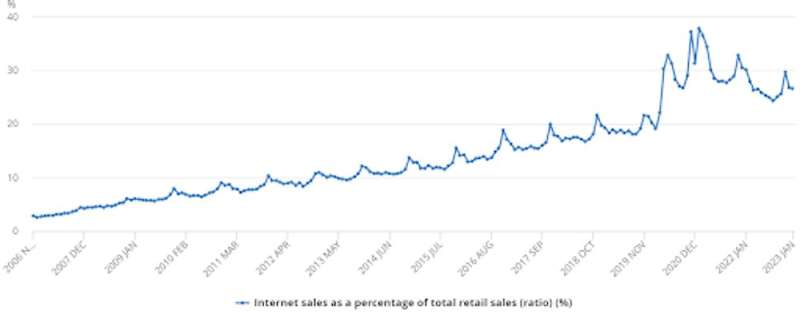This article has been reviewed according to Science X's editorial process and policies. Editors have highlighted the following attributes while ensuring the content's credibility:
fact-checked
trusted source
written by researcher(s)
proofread
UK shoppers are choosing bricks over clicks right now, but here's why it isn't the end for online retail

British retail sales figures showed an unexpected bump in activity over the Christmas shopping period that exceeded expectations—particularly given the current UK cost of living crisis.
But beneath the headlines of positive sales in recent months, it was more surprising to see physical stores performing markedly better than online shops. Many multi-channel retailers, including Next and Seasalt, said their physical stores outstripped online sales, while online retailers such as Asos and Boohoo experienced poor Christmas trading. Revenues for online grocery firm Ocado fell by 3.8% in 2022 despite record Christmas trading.
Even online retail giant Amazon was less successful in the UK last year. Accounting for exchange rate fluctuations, Amazon's sales figures suggested positive growth of 5.2% in sterling terms in 2022, but this was its lowest-ever annual growth rate in the UK.
The Christmas bonus for UK bricks and mortar shops was influenced by two issues. In addition to being the first "normal" Christmas since 2019—shops were open with no lockdowns or restrictions—a wave of postal strikes in November and December 2022 made online deliveries less predictable. And while rail strikes may have affected travel to some physical stores at the same time, local retail areas may still have benefited from concerns that online purchases might not make it under the tree by Christmas day.
The future of bricks versus clicks
The finance director of Primark, a resolute hold-out against online retail, believes online retail will not continue to grow rapidly, as it has done in recent years, and that it now looks "mature". After years of record online sales growth stoking fears for the future of British high streets, the tide seems to be turning for British shopping patterns.
The most recent retail sales figures from the Office for National Statistics show a plateauing of online retail sales over the past 12 months.
There are four main reasons for this flattening of online shopping figures.
1. Online retail reaching a peak
The current slowdown follows years of rapid growth, suggesting that online shopping has reached a peak, although this does not mean it will fall back rapidly any time soon. British online shopping figures have been higher than that of many other countries for much of the past decade. And British people continue to shop online a lot more than consumers in many other countries.

2. Annual shopping trends continue
An important component of the annual retail cycle is the peak in November and December each year. Black Friday is no longer a single-day event and Christmas remains a significant sales driver. British consumers clearly embrace online shopping during this key November and December sales period, although the 2019 figures (from just before COVID hit) suggested a reduction on previous years.
3. COVID-era changes
The scale of the disruption from COVID is obvious. As shops closed during lockdowns, online took up the strain and expanded rapidly. At its peak in January 2021, internet buying reached 37.8% of retail sales as the pandemic turbo-charged the online sector.
The web was a lifeline for many retailers and consumers during this period, providing businesses with another way to reach customers and continue operating, and providing a way for consumers to order goods amid general pandemic restrictions or if they had to shield. It is hard to imagine people completely stopping shopping online.
4. Meeting expectations
Finally, the online sector proportion of retail sales fell as we came out of out of lockdown, but this was expected. As the chart above shows, it is 26.6% as of January 2023, some 30% off its peak, but also above the long-term trend.
The recent figures in this series, along with more general signs, do hint at further change, however. The UK E-commerce trade association, imrg, predicts a declining online ecommerce sector in 2023. Consumers, despite cost of living and strikes, seem to want to return to the shops—and online retailing is not immune to cost pressures either.
It would be absurd to say online retailing is in crisis—it still claims a quarter of all retail sales. Consumers are used to having access to it and can see its benefits. As a retail option it is here to stay. But perhaps UK retail is reaching a more settled level of online sales. Of course, this idea has been proposed many times since Amazon launched its website in 1995 and online retail has continued to grow.
But just like everyone else during the current cost of living crisis, retailers with online offerings are trying to curtail their costs and exposures. If, as is claimed, one in three fashion items bought online are returned, it is easy to question the financial and environmental sustainability of the model.
Some retailers including Zara, Next and Moss Bros, have begun to charge for returns to limit costs. Others are charging for subscription services, such as Amazon and Tesco, or bundling offerings together to create an enhanced deal for consumers. The sector is taking a hard look at what works and at what cost and return on investment.
Consumers are also concerned about what they are spending. Working out the costs, impact and convenience of traveling versus online buying, on top of the actual price of the products, is important when money is tight. But different consumers will come up with different results depending on their situation, product, price and charges.
Online shopping provides many benefits. But, even with recent news of multiple corporate closures and collapses, it does seem that physical stores are enjoying a small renaissance as people rediscover the pleasure of shopping "in real life".
This article is republished from The Conversation under a Creative Commons license. Read the original article.![]()





















